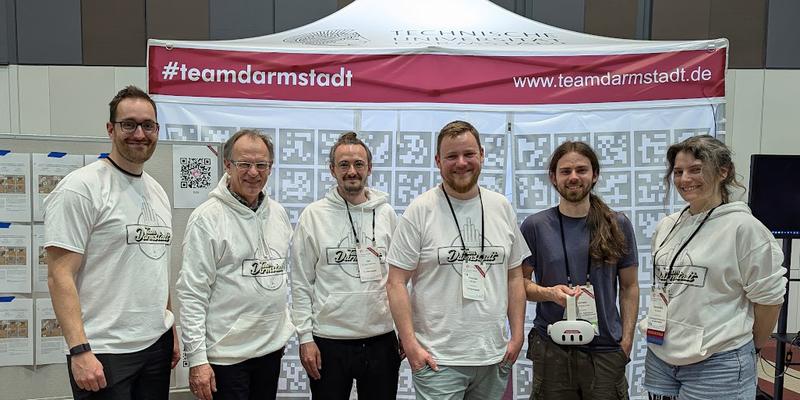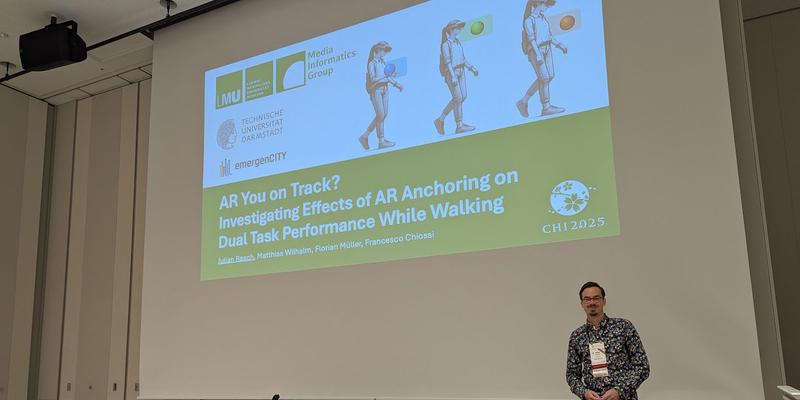Eight Contributions Presented at ACM CHI Conference
emergenCITY scientists presented work on resilient communication infrastructures, responsible AI systems, and the future of interactive urban technologies.
emergenCITY scientists presented work on resilient communication infrastructures, responsible AI systems, and the future of interactive urban technologies.

From April 26 to May 1, 2025, over 5000 researchers from around the globe gathered in Yokohama, Japan, for the ACM CHI Conference on Human Factors in Computing Systems. The CHI conference is the annual highlight in the calendar of many researchers and the flagship conference in the field of Human-Computer Interaction (HCI). This year’s conference featured more than 1,000 talks, 620 posters, 41 workshops, and 71 interactivities across 25 parallel tracks, setting new records in both size and scope.
A strong delegation from emergenCITY contributed to the conference across various tracks, presenting eight full papers alongside Late-Breaking Work (LBW) contributions (presented as posters), interactivities, and workshops. These works explored themes such as resilient communication infrastructures, responsible AI systems, and the future of interactive urban technologies. Notably, three full papers received Honorable Mention Awards, placing them among the top five percent of submissions. Further, one interactivity also received an Honorable Mention Award.
Among the awarded papers was “The User Perspective on Island-Ready 6G Communication”. For this Janzen et al. surveyed 857 participants in major German cities to understand app usage preferences during crises when only local cellular networks are available [1]. Further, Bäumler et al. explored how adolescents and young adults deal with harmful content on social media—and how platform designs could better support them. Based on eight focus groups, the emergenCITY researchers highlight the importance of inclusive and empowering reporting mechanisms [2]. Additionally, Rasch et al. demonstrated that displaying information in the user’s field of view via AR glasses can improve safety and performance when multitasking between the physical and digital worlds in mobile situations, such as when walking and navigating at the same time [3].

In the Late Breaking Work category, Achref Doula presented a research contribution that is part of the multi-year project 4D.City, co-funded by emergenCITY. The work introduced a new method for measuring, visualizing, and reducing the uncertainty inherent in AI-based object recognition [4]. Better handling of AI uncertainty is crucial for joint human-machine decision-making, such as in assisted or autonomous driving (e.g., “Is turning left allowed here?” or “Is that a plastic bag being blown across the street or a ball that a child might chase?”). Since the method identifies uncertainties already during training and brings a human into the loop early on, it outperforms the best-known approaches using little more than half the training data.
These contributions reflect emergenCITY’s commitment to advancing HCI research that addresses real-world challenges through interdisciplinary collaboration. The team not only presented its innovative work at CHI 2025, but also established and consolidated contacts with the global HCI community, which may lead to new exciting contributions at CHI 2026 - which will be held in Barcelona.
Author: Florian Müller is associated PI within the LOEWE center emergenCITY and Assistant Professor for Mobile Human-Computer Interaction at TU Darmstadt.
[1] Leon Janzen, Florentin Putz, Marc-André Kaufhold, Kolja Straub, and Matthias Hollick. 2025. The User Perspective on Island-Ready 6G Communication: A Survey of Future Smartphone Usage in Crisis-Struck Areas with Local Cellular Connectivity. In Proceedings of the 2025 CHI Conference on Human Factors in Computing Systems (CHI ‘25). Association for Computing Machinery, New York, NY, USA, Article 1049, 1–22. https://doi.org/10.1145/3706598.3714324
[2] Julian Bäumler, Helen Bader, Marc-André Kaufhold, and Christian Reuter. 2025. Towards Youth-Sensitive Hateful Content Reporting: An Inclusive Focus Group Study in Germany. In Proceedings of the 2025 CHI Conference on Human Factors in Computing Systems (CHI ‘25). Association for Computing Machinery, New York, NY, USA, Article 219, 1–22. https://doi.org/10.1145/3706598.3713542
[3] Julian Rasch, Matthias Wilhalm, Florian Müller, and Francesco Chiossi. 2025. AR You on Track? Investigating Effects of Augmented Reality Anchoring on Dual-Task Performance While Walking. In Proceedings of the 2025 CHI Conference on Human Factors in Computing Systems (CHI ‘25). Association for Computing Machinery, New York, NY, USA, Article 1217, 1–21. https://doi.org/10.1145/3706598.3714258
[4] Achref Doula, Max Mühlhäuser, and Alejandro Sanchez Guinea. 2025. AEXL: Enhancing Path Prediction with Active Explainable Learning via Large Language Models. In Proceedings of the Extended Abstracts of the CHI Conference on Human Factors in Computing Systems (CHI EA ‘25). Association for Computing Machinery, New York, NY, USA, Article 53, 1–6. https://doi.org/10.1145/3706599.3719963